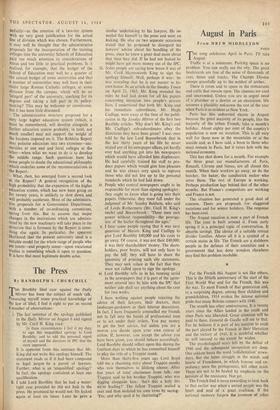August in Paris
From DREW MIDDLETON
PARIS
THE song celebrates April in Paris. I'll take August.
Traffic is at a minimum. Parking space is no problem. You can really see the city. The great boulevards are free of the noise of thousands of cars, buses and trucks. The Champs Elysees sweeps gracefully up to the noblest of arches.
There is room and to spare in the restaurants and cafés that remain open. The cinemas are cool and uncrowded. Unless you are in urgent need of a plumber or a dentist or an electrician, life assumes a placidity unknown the rest of the year when Paris is as strident as New York.
Paris has this unhurried charm in August because the great majority of its people, like the • majority of the urban French, take a month's holiday. About eighty per cent of the country's population is now on vacation. This is all very well for those now in the mountains or at the seaside and, as I have said, a boon to those who must remain in Paris, but it raises hob with the national economy.
This has shut down for a month. For example the three great car manufacturers of Paris, Renault, Citroen and Simca, are all closed this month. When their workers go away, so do the butcher, the baker, the candlestick maker who serve them. The rest of Europe is working. Perhaps production lags behind that of the 'other months. But France's competitors are working and France is not.
The situation has generated a good deal of concern. There are proposals for staggered vacations and for winter holidays. The response has been cool.
The August vacation is now a part of French life. The year is built around it. From early spring it is a principal topic of conversation. It absorbs savings. The choice of a suitable retreat divides families. Above all it is a symbol of a certain status in life. The French are a stubborn people in the defence of their amenities and a government that has done wonders elsewhere may find this problem insoluble.
For the French this August is not like others. This' is the fiftieth anniversary of the start of the First World War and for the French, this was the war. To most French of that generation and, to a surprising degree, among their children and grandchildren, 1914 evokes the intense national pride that many Britons connect with 1940.
The month has other anniversaries. It is twenty years since the Allies landed in the south and since Paris was liberated. Great attention will be paid to these. General de Gaulle will see to that. For he believes it is part of his mission to exalt the part played by the French in their liberation and the victory of 1945. It is doubtful whether he will succeed to the extent he wishes. The psychological scars left by the defeat of 1940 and the subsequent occupation are deep. One seldom hears the word 'collaboration' nowa- days. But the bitter struggle in the minds and hearts of Frenchmen, in which honour and ex- pediency were the protagonists, left other scars. These are not to be healed by emphasis on the heroism of the resistance. Not yet.
The French find it more rewarding to look back to that earlier war when a united people was the heart and soul of a great coalition. If the national memory forgets the presence of other




























 Previous page
Previous page